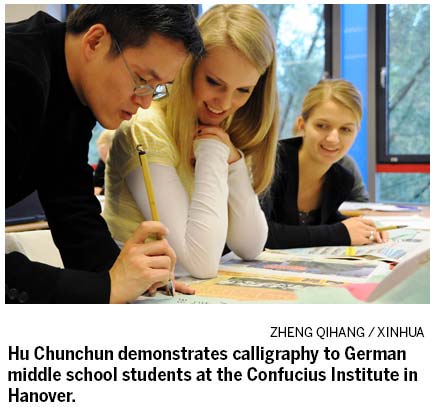

For Hu Chunchun, 40, director of the Confucius Institute in Hanover, Germany, life at the institute is more interesting than his teaching career.
"I used to live at my ease as an university teacher. But my current job is so interesting and challenging, because I have to communicate with locals every day," Hu, associate professor from the German Institute, Tongji University, says.
In 2007, Tongji University in Shanghai and China Center in Hanover co-established the Confucius Institute in Hanover, which now has six teachers and volunteers.
The China Center in Hanover, which was founded in 1997 with the support of the German and Chinese governments, is a registered association to promote Chinese language and culture.
"Many students are office workers, rather than university students. Our major task is to provide Chinese language courses and cultural activities for those who are already interested in China," says Hu, who pursued his PhD in the philosophy and humanities department at the Free University of Berlin, from 1998 to 2003.
He only planned to stay one year at first, but changed his mind quickly after.
"I've made various friends here due to my work, including those from governmental departments and universities. They are very humorous" he says.
He says they often cooperate with local associations and institutions, because the institute doesn't have a regular activity place.
To organize an activity, he says, there are a lot of things one has to do, such as order a room about four months ahead and send many e-mails to lecturers to negotiate details.
The institute not only offers Chinese teaching for two universities and one college in Hanover, but also cooperated with the local government to provide three-day experience classes of the Chinese language for middle school students.
In 2009, the institute started the annual Summer Camp in China for German Middle School Students, to invite more than 100 German youths to spend two weeks in China, visiting tourism spots and schools, and learning about Chinese culture.
"Other Confucius Institutes in Germany also joined us, to call on students in Germany to apply for the program. The summer camp is very popular among the students," he says.
"China and Germany have many things in common, such as perspectives on history and culture, but few people know that."
Hu says a shortcut to promote Chinese culture is to let Germans know about what they share in common, which may stir their interest in China.
He gives an example: Everyone knows the Silk Road linked China and Europe some 2,000 years ago, but few know it's the German geographer Ferdinand von Richthofen that coined the term in the 19th century.
He says Westerners are direct and like to follow a prescribed order, but Chinese usually do things without a plan and communicate indirectly.
"Although I've stayed in Germany for many years, I can't say 'no' directly like Germans. Like most Chinese, I don't know how to refuse others. The problem is that it may stir misunderstandings at work."
"Once a German asked, 'Mr Hu, do you have time on the third day of the 28th week?' I was dumfounded and had to check my calendar as I had no idea which day it was," he says.
"When Germans ask me about an activity in June next year, it's difficult to answer because we make our annual plans at the end of the year. We have no method to keep up with each other's pace."
He says he welcomes those who ask harsh questions about China, but these people are becoming fewer, as more people understand China.
"I've gained a strong sense of accomplishment here, because I can change a person's view by imparting new knowledge to him or her. I believe all teachers have the same feeling."
Hu is going to finish his five-year tenure soon and he plans to write a book about his experience at the institute.
"European civilization emphasizes technological development and reason, while Chinese civilization explores Confucianism and relations among people. If we combine the advantages of both civilizations, the human kind will benefit from it," the former president of the Parliament of Lower Saxony State Rolf Wernstedt, says.
Wernstedt says Sino-Europe dialogue has begun, but mainly in the field of the economy. He believes the Confucius Institute can play its role in promoting culture between the two countries.
xulin@chinadaily.com.cn